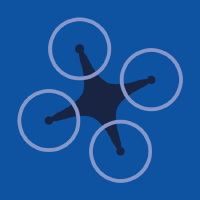Topic Menu
► Topic MenuTopic Editors


Cooperative Localization, Optimization and Control of Networked Autonomous Systems: Theories, Analysis Tools and Applications
Topic Information
Dear Colleagues,
Networked autonomous systems, including unmanned surface/underwater/ground/aerial vehicles, robotics, transportation systems, power systems, and power electronics, have become useful tools to replace, help, or assist humans in various missions such as inspection and monitoring, surveillance, search, energy transmission, exploration, fault diagnosis and estimation, logistics and transportation, etc. Practical uses for such missions in both civilian and defense contexts have experienced significant growth thanks to recent technological progress in artificial intelligence (AI), computing devices, and renewable energy exploitation. With the rapid development of modern industry, determining how to further develop advanced localization, optimization, and control algorithms and apply them to actual applications has important research significance and prospects. This topic aims to present recent advances in technologies and algorithms to improve the levels of autonomy, reliability, safety, and stability of networked autonomous systems. It aims to compile new theoretical concepts, new design and analysis tools, and novel application cases. Potential topics of interest include but are not limited to the following:
- Control, optimization, or learning of multi-agent systems and related applications
- Dynamic positioning/path following/trajectory tracking/target tracking of autonomous systems including unmanned surface/underwater/ground/ aerial vehicles
- Theory and control systems with artificial intelligence using neural networks and machine learning
- Sensor network localization and indoor/outdoor localization
- Vision-based localization and formation
- Localization and control with safety guarantees
- Target localization and tracking of unmanned systems
- Data-driven techniques for network identification, modeling, and control
- Formal safety certification for large-dimensional networked systems
- Remote robotic rehabilitation and healthcare applications
- Stability and security enhancement of networked power systems with renewable energy sources
- Deep reinforcement learning for power systems security-constrained optimization
- Power electronics and converter-based power system modeling and control
- Comprehensive energy and its applications
- Fault-tolerant control, fault diagnosis, and cyber security control
Dr. Xu Fang
Prof. Dr. Chao Deng
Dr. Shankar A. Deka
Dr. Jitao Li
Dr. Heling Yuan
Topic Editors
Participating Journals
| Journal Name | Impact Factor | CiteScore | Launched Year | First Decision (median) | APC |
|---|---|---|---|---|---|

Drones
|
4.8 | 7.4 | 2017 | 20.1 Days | CHF 2600 |

Electronics
|
2.6 | 6.1 | 2012 | 16.8 Days | CHF 2400 |

Energies
|
3.2 | 7.3 | 2008 | 16.2 Days | CHF 2600 |

Journal of Marine Science and Engineering
|
2.8 | 5.0 | 2013 | 15.6 Days | CHF 2600 |

Mathematics
|
2.2 | 4.6 | 2013 | 18.4 Days | CHF 2600 |

Preprints.org is a multidisciplinary platform offering a preprint service designed to facilitate the early sharing of your research. It supports and empowers your research journey from the very beginning.
MDPI Topics is collaborating with Preprints.org and has established a direct connection between MDPI journals and the platform. Authors are encouraged to take advantage of this opportunity by posting their preprints at Preprints.org prior to publication:
- Share your research immediately: disseminate your ideas prior to publication and establish priority for your work.
- Safeguard your intellectual contribution: Protect your ideas with a time-stamped preprint that serves as proof of your research timeline.
- Boost visibility and impact: Increase the reach and influence of your research by making it accessible to a global audience.
- Gain early feedback: Receive valuable input and insights from peers before submitting to a journal.
- Ensure broad indexing: Web of Science (Preprint Citation Index), Google Scholar, Crossref, SHARE, PrePubMed, Scilit and Europe PMC.




